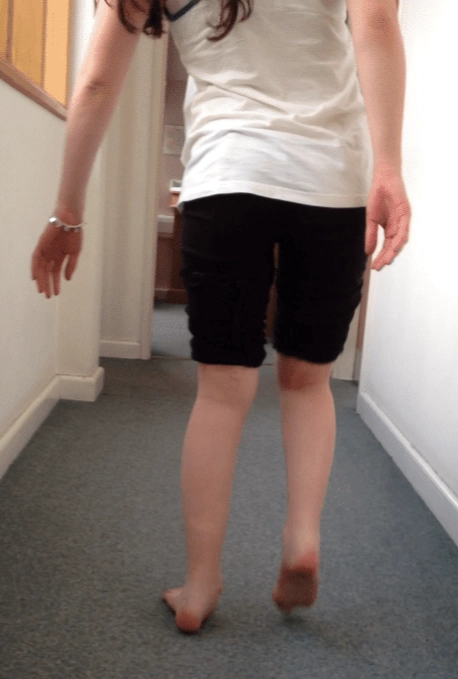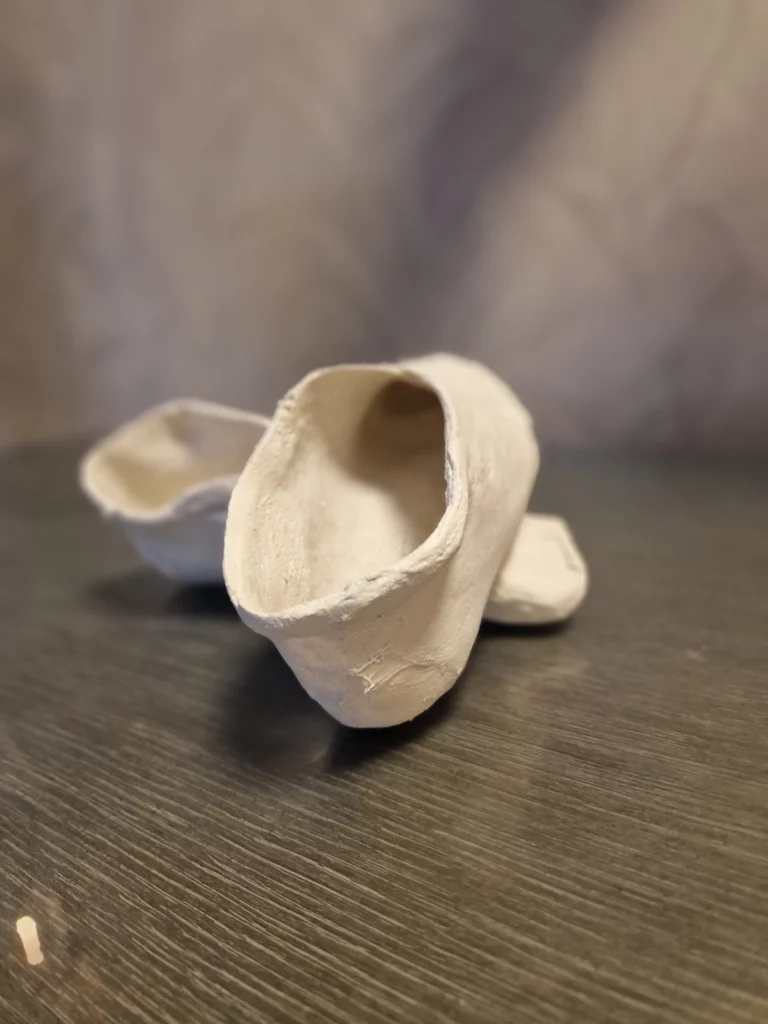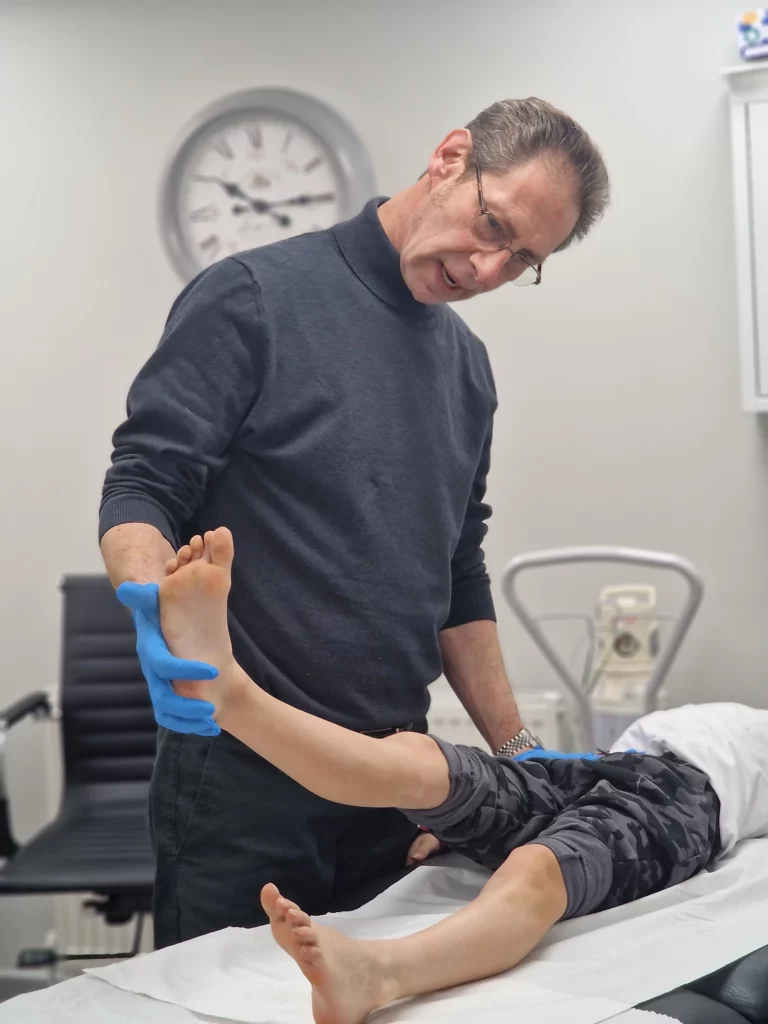Podiatry and Biomechanics department
The human foot is designed to function on soft surfaces, but as human society has developed, we now spend every day walking on hard, flat surfaces creating adaptive changes in human mechanics and causing long term wear and tear to our feet, knees and backs.
Podiatry at The Lawrence Clinic, Pudsey and in conjunction with both the Physiotherapy and Chiropractic Departments, specialise in the study of your body’s movements during standing, walking and running and the effects of these movements on our skeletal system whilst adopting a ‘team approach’ in your management and care.
Foot and ankle pain can be caused by a Biomechanical dysfunction and abnormal gait or walking patterns due to structural or muscular imbalances, the primary cause of which may not just be at foot / ankle level, but as a consequence of mechanical problems, be associated with the leg, knee, hip or low back.


Podiatry with Orthotic Insoles
Just as people’s eyes differ, your feet vary in size, shape and function, our Podiatry specialist will examine the underlying Biomechanical changes that may have contributed to your symptoms, this may be performed using gait analysis, and if required, functionally-prescriptive shoe inserts or Orthotics will be produced from a plaster cast impression of your feet, a laboratory will manufacture these devices from a prescription, similar to a set of dentures.
Orthotics will realign your feet and ankles and help in both correcting and controlling body posture to reduce your symptoms, and are designed to help and give relief to the following common complaints:
- Heel pain e.g plantar fasciitis
- Achilles tendonitis
- Flat feet
- Knee pain
- Low back pain


Children’s Podiatry
Some feet have special needs. Children’s feet are still forming and are quite fragile, they can be damaged easily by shoes and socks that are too small.
Early examination of children’s feet is a preventative measure. Walking, running, jumping places greater physical demands on the body than normal daily activities. Whilst running, your feet can absorb 3 times your body weight, it’s no wonder injuries to the lower limb and foot account for a large proportion of sporting injuries.
Some common conditions affecting children’s feet that can be helped with Orthotics are:
- Sever’s disease
- Osgood Schlatters disease
- Flat feet
- In toe/Out toe walking
Children’s feet have a unique developmental pattern of their own. A regular check-up with a Podiatry specialist is recommended from when your child starts to walk on an annual basis, more so, if your child regularly participates in sport and if you notice:
- uneven shoe wear
- hard skin/corns
- complains of recurrent pain in legs, feet or even low back
- is constantly tripping or falling
- enlarged joints in foot
- Heel pain (plantar fasciitis)
- Knee pain
- Low back pain
- Hip pain
- Metatarsalgia
- Iliotibial Band Syndrome
- Achilles tendonitis
- Shin Splints (medial tibial stress syndrome)


Soles are a perfect match for Alex
Thursday 2nd July 2009 Telegraph & Argus
Musculoskeletal Podiatrist Jonathan Stanley fits Alex for some corrective insoles, or orthotics.
Tennis hopeful Alex Johnston hopes to return to the competitive circuit – thanks to some special insoles.
The promising ace’s progress has been hampered by injury since becoming a full-time professional player two years ago, but since seeking help through the Valley Clinic in his home town of Ilkley, Alex is hopeful his competitive career could soon be back on track.
Alex was attending the clinic for regular post-operative physiotherapy sessions with Liz Blizzard, a physiotherapist who wears special insoles for knee pain caused by wear and tear through sport.
Liz recommended Alex to see podiatrist Jonathan Stanley at the Ilkley clinic she set up last year. Jonathan, who specialises in musculoskeletal problems, has worked with the England cricket team and Bradford Bulls.
His training in musculoskeletal medicine – biomechanics – enables him to study the body’s movements during walking, running and other sporting activities to assess the affects that movements are having on the body.
Special insoles were created to correct the position of Alex’s foot which was causing his knee to twist. Jonathan devised a numerical prescription which was sent, along with plaster of Paris cast impressions he took of Jonathan’s foot, to a laboratory where the special insoles, known as orthotics, were created.
“It is a treatment option,” says Jonathan. “Over the years I have treated thousands of patients, as have other colleagues of mine, to good effect. Orthotics help improve overall posture and gait with hopefully a reduction in their symptoms.”
Says Alex: “The insoles have effectively and painlessly altered the way I bear weight through my foot, which, in turn, relieved the pressure on my affected knee.”
Alex suffered his first serious knee injury two years ago while playing tennis in Barcelona. A scan revealed that he had torn his meniscus – the cartilage outside the knee.
Alex had two operations to help rectify the problem and is now wearing the special insoles to stabilise his knee.
“With sports people, orthotics can help correct your gait. The ones I have get me to change the position of the way I push down when I walk. It takes the pressure off the outside of the knee,” explains Alex.
“Using the orthotics has made a huge difference to me. Maintaining match fitness is a constant challenge for an aspiring athlete and it is frustrating to be off court, so having help from professionals who can quickly diagnose and find solutions that work is extremely important to me.”
Alex had a slight setback when he recently twisted and fell on his ankle during a training session at the tennis academy he attends in Surrey. Following extensive physiotherapy sessions at the Valley Clinic, using hands-on technique, exercise and electrotherapy to reduce swelling and promote healing, Alex is hopeful he will be back on court soon.
“I will have to be careful at first and try not to do too much, too soon, but I am already looking ahead to a tournament next month,” he says.
Alex’s interest in the game began while watching his parents play on family holidays. Encouraged by them, Alex began lessons. He started playing seriously when he was ten. After moving to Ilkley, aged 11, Alex started playing with the Ilkley Lawn Tennis and Squash Club.
He decided to become a professional sportsman after completing his GCSEs and went to Barcelona to play, before his knee injury forced him to return home to recuperate.
Alex has already played on the first rung of the international circuit in Texas and Mexico and is considering playing for an American College team.
Click here to get in touch or Call 0113 2900 310 to book your appointment now.
